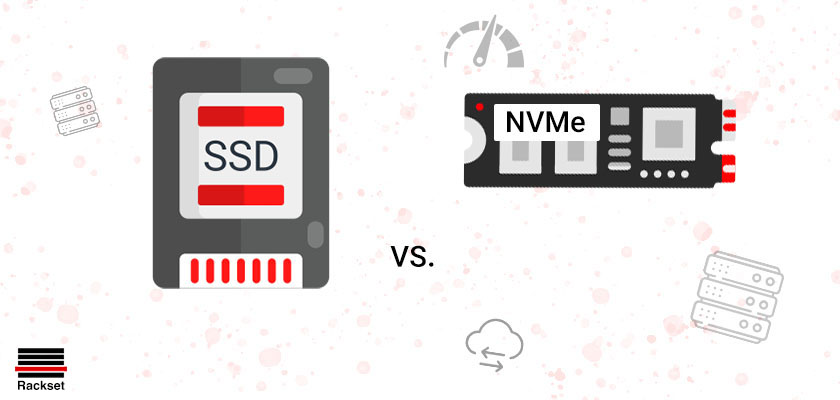
If you are looking for the best option for web-based projects or applications, you’ll find a variety of VPS hosting choices. It doesn’t matter if you’re an eCommerce store owner or web-based designer, or a seasoned blogger; the success of your website’s project is largely dependent upon the technology of storage the hosting server is using.
The type of storage that is utilized by your VPS is the biggest influence on the user’s perception of rapidity and speed. This is because storage technology is evolving quickly to provide robust, efficient, fast, and reliable web hosting. In this article, we’ll examine the differences between NVMe vs. SSD server VPS hosting. Both are solid-state. However, the differences between them may result in very different outcomes. In this article, we would like to discuss the NVMe Virtual Private server vs the SSD server.
What Are NVMe Drivers?
NVMe stands for Non-Volatile memory express. It is an innovative and exciting communication interface that overcomes the problems with storage technology. The NVMe protocol is designed to enable seamless access to SSDs with high speeds. It’s also solid-state similar to SATA (Serial ATA) SSDs, but the speed and performance are not the same.
To put it into perspective in its simplest form, break it down; NVM (Non-volatile memory) is a memory that is able to keep its stored data in place regardless of when the power source is interrupted. However, volatile memory erases the deleted data when there’s no power. SSDs, spinning disks and various hard disk drives are instances of memory that are non-volatile. With that in mind, NVMe technology utilizes non-volatile memory to store your data even when the power goes out.
NVMe is also using a more modern interface for communication with the operating system and CPU PCI express or PCIe. It is a more efficient communication method. The new interface is able to communicate directly to the processor, making for greater speed (and consequently, faster speeds) and a shorter time to respond.
What Are SSD Drives?
SSD (Solid State Drives) is a piece of hardware that utilizes the technology of solid-state storage to store data in flash memory. There are many kinds of flash storage devices, but NAND is by far the most popular.
We are aware that SSDs offer significantly faster write and read speeds than conventional HDDs (Hard Disk Drives). But, SSDs also have some limitations in relation to speed and speed maximum for storage protocols.
SSDs generally work under the use of SATA as well as SAS interfaces. Both of these impede the performance of more powerful drives. In the beginning, SATA was the SATA interface created specifically for HDDs and was also employed for earlier SSDs to allow backward compatibility. However, as time went by, SATA posed limitations to the SSDs capabilities.
To solve this issue, the developers created to address this issue, developers created the NVMe protocol that relies upon the PCI Express (PCIe) interface. This interface lets NVMe provide faster speeds, higher performance and overall greater reliability. All of them fall under the same umbrella of “SSD” because they all utilize solid-state memory for the storage of data.
In the beginning, NVMe drives were offered as cards that were added in with PCI 2.0 and PCIe 3.0 interfaces. They were designed to be attached to the PCIe connector of the motherboard of the server. In the future, 2.5″ NVMe drives were developed that are connected to motherboards via U.2 or U.3 connectors.
What Is NVMe SSD vs. SSD?

As stated above, NVMe is a non-volatile memory that can write and read data with electronic circuits. Therefore, in this sense, it’s quite like SSD. It is possible to ask: what are the differences between them? If they are different, then there must be a difference.
The major difference between them is in the explicit protocol you see in NVMe, which is specifically designed to increase the internal parallelism as well as reduce the delay of SSDs. NVMe is utilized as a connection between the SSD and the motherboard of the server through a more efficient and modern interface. In simpler terms. Technically when you see SSD hosting, it generally implies that solid-state storage is linked to the server you’ve purchased or are planning to buy using an older interface like SATA and SAT.
Is NVMe Superior to SSD? (NVMe vs. SSD)
To answer this question, we must first look at the essential details all users should know regarding NVMe or SSDs.
Speed
The majority of the time, NVMe isn’t subject to the ATA interface since it is directly on top of PCI express. It is directly linked to the CPU, which means the input and output processes are four times faster, and when you need to request data or seek information, the results will be displayed 10 times quicker. NVMe is able to perform the read-write operation at 2000 MB/s, which is a lot faster than SATA SSD, which is restricted to 600 MB/s.
Performance
NVMe is the default option that allows drives to benefit from lanes that are directly connected to the CPU. This, of course, is superior to the lanes that are found in many PCIe SSDs. Furthermore, PCIe sockets can transmit 25x more information than the SATA equivalent.
In light of these two aspects, we will let you decide whether NVMe virtual private server is better than the SSD server or not.
NVMe Is Different from SATA
Let us go over an example. Let’s say you own a Samsung 860 Pro, which is a 2.5-inch SSD, but it has a read speed of 560MB/s. The same situation applies if you consider its successor, the 960 Pro, which is based on NVMe and is equipped with 3500 MB/s. Which would you say is the fastest?
As mentioned above, the main reason for the super-fast NVMe technology lies within its direct connections. In the above example, the 860 Pro drive is connected to the PC using SATA, and NVMe-based drives are regarded as the latest technology everyone is seeking.
Read More: What Is CPU? Different Types of CPUs
What Are the Benefits of Choosing an NVMe SSD VPS?

Our VPS solutions by the NVMe SSD drive have been designed to meet your needs for performance at a cost-effective price. In this way, you can receive a robust solution that comes with resources specifically designed for your business. They are priced at a lower price than dedicated servers, and you’ll be able, to begin with, a smooth start to your project and enjoy all the advantages of a dedicated server.
As an example, you’ve created an online game. However, the budget to host the game is limited. For a low-cost hosting option, you could select a Game VPS.
Select the most suitable SSD VPS that is suited to your needs, then start your journey.
Conclusion
In this article, we discussed NVMe hosting and compared NVMe vs SSD servers. Overall, NVMe is the most recent technology that the majority of hosting companies use. The cost of NVMe-based hosting packages differs from the standard SSD or SATA VPS hosting. The reason can be attributed to the technological advancements behind NVMe. It can be directly linked to the processor. Therefore, it allows for the transfer of files extremely fast.
Leave a Reply